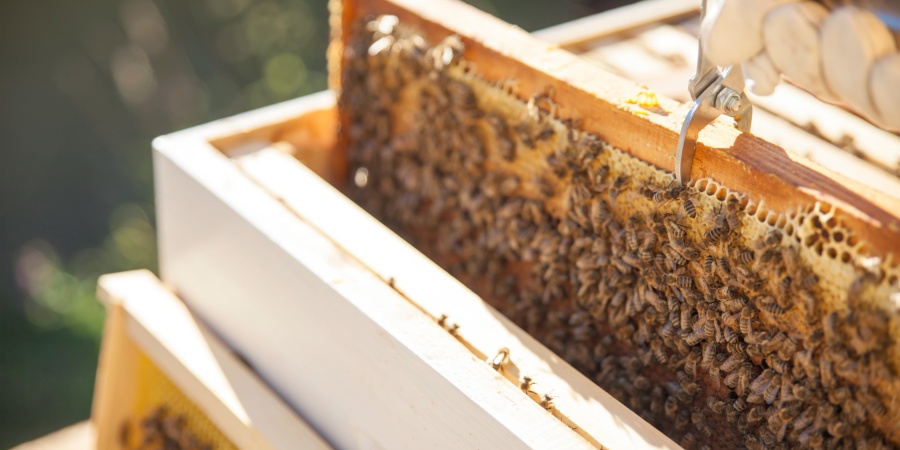
Worker bees on a honeycomb
Beekeepers need to apply for and be approved to access certain sites to place beehives and remove honey, bees-wax and pollen from the land. The approval is given in the form of an apiary authority, which may be a permit or licence.
DBCA manages and issue apiary permits and licences in accordance with Part 8A – Apiary permits and licences of the Conservation and Land Management Regulations 2002.
Land that DBCA can issue apiary permits or licences for includes:
national parks, conservation parks, nature reserves, state forest, timber reserves, pastoral leases, mining tenements and unallocated crown land.
DBCA does not issue permits/licences on Crown lands vested with local governments or State or Commonwealth government agencies.
DBCA does not issue permits/licences on private land.
If you wish to apply for access to a site for beekeeping on certain Crown lands, you will need to supply the following documents:
- An application through the online Apiary Authority System with coordinates for proposed sites, photo of the site, information if clearing is required and payment details;
- public liability insurance certificate with $ 10 million coverage;
- the certificate of registration as a beekeeper from the Department of Primary Industries and Regional Development; and
- a disease risk area permit if applying for sites within a disease risk area (note this can be obtained at a later date).
How to apply
To access sites on certain Crown lands, applications may be made online using the Apiary Authority System. A user guide to using the system to apply is available in the downloads section below.
Application/Approval Time
You will ensure your application is processed in a timely manner please by submitting all of the above information with your application. You are also encouraged to speak with the relevant DBCA district office prior to submitting an application. DBCA district staff can provide more information on the potential suitability of the prospective site, access considerations and if clearing of vegetation may be required.
Licence or Permit
What is the difference between an apiary permit and an apiary licence? Both are a form of authority to access sites on certain Crown lands and both have conditions attached.
Licences and permits are granted in accordance with Part 8, Division 1 and 2 of the CALM Act and Regulations. Licences may be granted for up to 5 years and are issued for sites that are located on the following land:
- National Park
- Conservation Park
- Nature Reserve
Permits are granted for a term of 7 years and are issued for apiary sites on the following types of land:
- State Forest
- Timber reserve
- Unallocated Crown Land
- Pastoral leases
- Mining tenements
Fees
There is a non-refundable application fee for each application, that allows you to select up to 5 sites. This fee contributes towards the cost of DBCA assessing and administering your application.
If you are granted an apiary authority, you will be charged an annual fee to keep the site. This fee contributes towards the cost of DBCA managing sites for beekeeping on certain Crown lands. Beekeepers no longer using sites are encouraged to return the apiary authorities to avoid paying unnecessary annual fees and so that other beekeepers can use the sites.
Beekeepers are able to borrow sites held by other beekeepers, with approval from the site holder. To do this, you need to make a “Temporary use” application through the online system.
Clearing Vegetation
Beekeepers are strongly encouraged to identify sites that can be accessed without the need to clear native vegetation. However, if clearing is required to place hives on an approved apiary site, this must first be discussed with the DBCA district office, and the beekeeper must apply for a clearing permit from the Department of Water and Environmental Regulation (DWER). The application for a clearing permit is available on DWER’s website.
Apiary Site Use Notification
Under the Conservation and Land Management Regulations 2002, an Apiary Authority Holder must notify DBCA prior to placing or removing beehives on a site. The online system provides an efficient way for beekeepers to do this Apiary Authority System. Note that this information helps DBCA keep beekeepers informed of any operations that may affect sites, including prescribed burning. Whilst this data will be kept confidential within the department, at an industry level, it also helps to provide insights on site usage.
General Conditions
To conserve the biodiversity and floral resources of WA’s parks, conservation reserves and certain Crown lands for beekeeping, conditions apply to apiary Authorities. The conditions are also in place to help manage the lands for multiple uses and industries, and also address risk management and safety. The General conditions for the use of apiary authorities granted under the Conservation and Land Management Act 1984 (CALM Act) are available here. The General Conditions came into effect on 15 August 2022.
